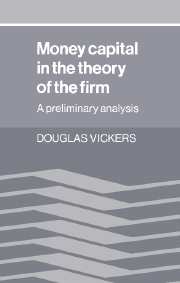Book contents
- Frontmatter
- Contents
- Preface
- PART I Theoretical issues and analytic motivation
- PART II The neoclassical tradition
- 4 Production, pricing, investment, and financing interdependence in the firm
- 5 Probability, risk, and economic decisions
- 6 Utility, uncertainty, and the theory of choice
- 7 Financial asset markets and the cost of money capital
- 8 The cost of money capital: further analysis and controversy
- 9 The investment expenditure project
- PART III Postclassical perspectives
- References
- Index
7 - Financial asset markets and the cost of money capital
Published online by Cambridge University Press: 18 September 2009
- Frontmatter
- Contents
- Preface
- PART I Theoretical issues and analytic motivation
- PART II The neoclassical tradition
- 4 Production, pricing, investment, and financing interdependence in the firm
- 5 Probability, risk, and economic decisions
- 6 Utility, uncertainty, and the theory of choice
- 7 Financial asset markets and the cost of money capital
- 8 The cost of money capital: further analysis and controversy
- 9 The investment expenditure project
- PART III Postclassical perspectives
- References
- Index
Summary
The problem of money capital, we have argued, needs to be integrated into the theory of the firm at as early a stage as possible. To employ the categories that the neoclassical theory inherited from Marshall, it needs to be incorporated before the beginning of the short-run, rather than after the end of the long-run, analysis. Otherwise, money capital has no analytically integrative significance for the theory of the firm at all.
Moreover, the notion of money capital, together with that of the money capital availability constraint, imports into the theory of the firm the realities of uncertainty and the lack of perfect expectation and foresight. The cost of money capital is very much an uncertainty concept. It takes up the questions of intertemporal valuation and the specification of risk-adjusted discount rates, or the rates of return required by the risk-averting suppliers of money capital at which future income streams should be reduced to their economic values. Behind the neoclassical development of these concepts lies a highly developed theory of the money capital or financial asset market. The cost of capital depends, in that body of analysis, on the prices of risky assets and the rates of return they provide when equilibrium conditions in the asset market are satisfied.
The apparatus we need in order to consider this equilibrium theory of prices and yields has been almost completely assembled in the preceding chapters. The theory is heavily indebted to the thought forms of the probability calculus.
- Type
- Chapter
- Information
- Money Capital in the Theory of the FirmA Preliminary Analysis, pp. 133 - 155Publisher: Cambridge University PressPrint publication year: 1987
- 1
- Cited by



